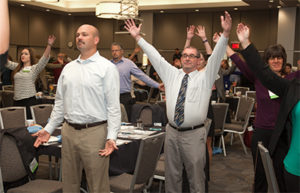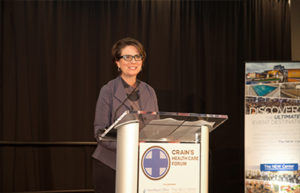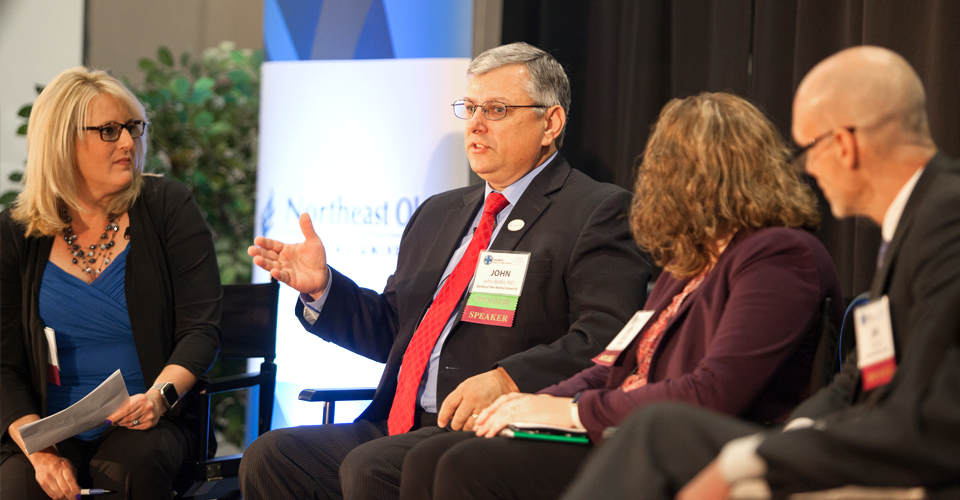 For the first time, the annual Crain’s Health Care Forum convened last week at the NEOMED Education and Wellness (NEW) Center. Previously held in Cleveland, the Sept. 28 event, titled “Population Health: What it means for health care and Northeast Ohio,” brought more than 200 people to the Rootstown campus to discuss issues of population health—and get a little yoga workout, too.
For the first time, the annual Crain’s Health Care Forum convened last week at the NEOMED Education and Wellness (NEW) Center. Previously held in Cleveland, the Sept. 28 event, titled “Population Health: What it means for health care and Northeast Ohio,” brought more than 200 people to the Rootstown campus to discuss issues of population health—and get a little yoga workout, too.
The crowd of health care and business professionals gathered in the NEW Center, a 177,000-square foot, multi-use facility that complements the University’s interprofessional teaching with primary care and physical therapy practices; a pharmacy of the future that’s consultative and treats the whole person; a wellness center that draws 1,500 regular users from the surrounding community; and child care, all placed around the first level of a beautiful atrium.
And while attendees were there to discuss population health, it was a reception on the second level of the atrium, with its perimeter of conference rooms and spacious event halls, that sparked conversation among those who didn’t realize such conference and event facilities existed less than 45 minutes from any major Northeast Ohio city.
 Elizabeth McIntyre, the publisher and editor of Crain’s, welcomed the group to NEOMED’s wonderful facility. Jay A. Gershen, D.D.S., J.D., the University’s president, noted two components of NEOMED training that promote population health—a term defined by keynote presenter Nabil Chehade, M.D., as refocusing health care on keeping people well, so that small or chronic problems don’t become big ones.
Elizabeth McIntyre, the publisher and editor of Crain’s, welcomed the group to NEOMED’s wonderful facility. Jay A. Gershen, D.D.S., J.D., the University’s president, noted two components of NEOMED training that promote population health—a term defined by keynote presenter Nabil Chehade, M.D., as refocusing health care on keeping people well, so that small or chronic problems don’t become big ones.
For one, Dr. Gershen noted that NEOMED works to combat obesity—a partner in many chronic conditions—by having all students become members of Sequoia Wellness, the fitness facility in the NEW Center. In addition, the University’s Best Practices in Schizophrenic Treatment (BeST) Center recognizes the role that mental health plays in a person’s well-being. The BeST Center Center provides guidance to the broader medical community by promoting evidence-based treatment practices that improve the lives of people impacted by schizophrenia.
In his keynote, Dr. Chehade traced the evolution of health care from a fee-for-service system, which rewards physicians for ‘’doing things’’ to people who are sick to what is called ‘’value-based medicine,’’ based more on empowering people to take preventive measures that keep them well. Then Dr. Chehade pointed to the future, as he said Kaiser Permanente has begun to envision it. In such a future, caregivers would meet the patient where they are—in their own home.
Breakout sessions, a panel discussion moderated by Monica Robins (senior health correspondent for WKYC-TV) and a yoga session completed the half-day event.
